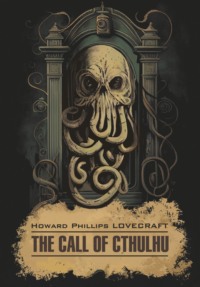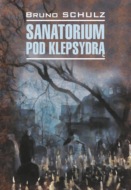Kitabı oku: «The Call of Cthulhu / Зов Ктулху», sayfa 3
Johansen and his men landed at a sloping mud-bank on this monstrous Acropolis, and clambered slipperily up over titan oozy blocks which could have been no mortal staircase. The very sun of heaven seemed distorted when viewed through the polarizing miasma welling out from this sea-soaked perversion, and twisted menace and suspense lurked leeringly in those crazily elusive angles of carven rock where a second glance showed concavity after the first showed convexity.
Something very like fright had come over all the explorers before anything more definite than rock and ooze and weed was seen. Each would have fled had he not feared the scorn of the others, and it was only half-heartedly that they searched―vainly, as it proved―for some portable souvenir to bear away.
It was Rodriguez the Portuguese who climbed up the foot of the monolith and shouted of what he had found. The rest followed him, and looked curiously at the immense carved door with the now familiar squid-dragon bas-relief. It was, Johansen said, like a great barn-door; and they all felt that it was a door because of the ornate lintel, threshold, and jambs around it, though they could not decide whether it lay flat like a trap-door or slantwise like an outside cellar-door. As Wilcox would have said, the geometry of the place was all wrong. One could not be sure that the sea and the ground were horizontal, hence the relative position of everything else seemed phantasmally variable.
Briden pushed at the stone in several places without result. Then Donovan felt over it delicately around the edge, pressing each point separately as he went. He climbed interminably along the grotesque stone molding―that is, one would call it climbing if the thing was not after all horizontal―and the men wondered how any door in the universe could be so vast. Then, very softly and slowly, the acre-great panel began to give inward at the top; and they saw that it was balanced.
Donovan slid or somehow propelled himself down or along the jamb and rejoined his fellows, and everyone watched the queer recession of the monstrously carven portal. In this fantasy of prismatic distortion it moved anomalously in a diagonal way, so that all the rules of matter and perspective seemed upset.
The aperture was black with a darkness almost material. That tenebrousness was indeed a positive quality; for it obscured such parts of the inner walls as ought to have been revealed, and actually burst forth like smoke from its eon-long imprisonment, visibly darkening the sun as it slunk away into the shrunken and gibbous sky on flapping membranous wings. The odor arising from the newly opened depths was intolerable, and at length the quick-eared Hawkins thought he heard a nasty, slopping sound down there. Everyone listened, and everyone was listening still when It lumbered slobberingly into sight and gropingly squeezed Its gelatinous green immensity through the black doorway into the tainted outside air of that poison city of madness.
Poor Johansen's handwriting almost gave out when he wrote of this. Of the six men who never reached the ship, he thinks two perished of pure fright in that accursed instant. The Thing cannot be described―there is no language for such abysms of shrieking and immemorial lunacy, such eldritch contradictions of all matter, force, and cosmic order. A mountain walked or stumbled. God! What wonder that across the earth a great architect went mad, and poor Wilcox raved with fever in that telepathic instant? The Thing of the idols, the green, sticky spawn of the stars, had awaked to claim his own. The stars were right again, and what an age-old cult had failed to do by design, a band of innocent sailors had done by accident. After vigintillions of years great Cthulhu was loose again, and ravening for delight.
Three men were swept up by the flabby claws before anybody turned. God rest them, if there be any rest in the universe. They were Donovan, Guerrera and Angstrom. Parker slipped as the other three were plunging frenziedly over endless vistas of green-crusted rock to the boat, and Johansen swears he was swallowed up by an angle of masonry which shouldn't have been there; an angle which was acute, but behaved as if it were obtuse. So only Briden and Johansen reached the boat, and pulled desperately for the Alert as the mountainous monstrosity flopped down the slimy stones and hesitated floundering at the edge of the water.
Steam had not been suffered to go down entirely, despite the departure of all hands for the shore; and it was the work of only a few moments of feverish rushing up and down between wheels and engines to get the Alert under way. Slowly, amidst the distorted horrors of that indescribable scene, she began to churn the lethal waters; whilst on the masonry of that charnel shore that was not of earth the titan Thing from the stars slavered and gibbered like Polypheme cursing the fleeing ship of Odysseus. Then, bolder than the storied Cyclops, great Cthulhu slid greasily into the water and began to pursue with vast wave-raising strokes of cosmic potency. Briden looked back and went mad, laughing shrilly as he kept on laughing at intervals till death found him one night in the cabin whilst Johansen was wandering deliriously.
But Johansen had not given out yet. Knowing that the Thing could surely overtake the Alert until steam was fully up, he resolved on a desperate chance; and, setting the engine for full speed, ran lightning-like on deck and reversed the wheel. There was a mighty eddying and foaming in the noisome brine, and as the steam mounted higher and higher the brave Norwegian drove his vessel head on against the pursuing jelly which rose above the unclean froth like the stern of a demon galleon. The awful squid-head with writhing feelers came nearly up to the bowsprit of the sturdy yacht, but Johansen drove on relentlessly.
There was a bursting as of an exploding bladder, a slushy nastiness as of a cloven sunfish, a stench as of a thousand opened graves, and a sound that the chronicler would not put on paper. For an instant the ship was befouled by an acrid and blinding green cloud, and then there was only a venomous seething astern; where―God in heaven!―the scattered plasticity of that nameless sky-spawn was nebulously recombining in its hateful original form, whilst its distance widened every second as the Alert gained impetus from its mounting steam.
* * *
That was all. After that Johansen only brooded over the idol in the cabin and attended to a few matters of food for himself and the laughing maniac by his side. He did not try to navigate after the first bold flight, for the reaction had taken something out of his soul. Then came the storm of April 2nd, and a gathering of the clouds about his consciousness. There is a sense of spectral whirling through liquid gulfs of infinity, of dizzying rides through reeling universes on a comet's tail, and of hysterical plunges from the pit to the moon and from the moon back again to the pit, all livened by a cachinnating chorus of the distorted, hilarious elder gods and the green, bat-winged mocking imps of Tartarus.
Out of that dream came rescue―the Vigilant, the vice-admiralty court, the streets of Dunedin, and the long voyage back home to the old house by the Egeberg. He could not tell―they would think him mad. He would write of what he knew before death came, but his wife must not guess. Death would be a boon if only it could blot out the memories.
That was the document I read, and now I have placed it in the tin box beside the bas-relief and the papers of Professor Angell. With it shall go this record of mine―this test of my own sanity, wherein is pieced together that which I hope may never be pieced together again. I have looked upon all that the universe has to hold of horror, and even the skies of spring and the flowers of summer must ever afterward be poison to me. But I do not think my life will be long. As my uncle went, as poor Johansen went, so I shall go. I know too much, and the cult still lives.
Cthulhu still lives, too, I suppose, again in that chasm of stone which has shielded him since the sun was young. His accursed city is sunken once more, for the Vigilant sailed over the spot after the April storm; but his ministers on earth still bellow and prance and slay around idol-capped monoliths in lonely places. He must have been trapped by the sinking whilst within his black abyss, or else the world would by now be screaming with fright and frenzy. Who knows the end? What has risen may sink, and what has sunk may rise. Loathsomeness waits and dreams in the deep, and decay spreads over the tottering cities of men. A time will come―but I must not and cannot think! Let me pray that, if I do not survive this manuscript, my executors may put caution before audacity and see that it meets no other eye.
The Colour out of Space
West of Arkham the hills rise wild, and there are valleys with deep woods that no axe has ever cut. There are dark narrow glens where the trees slope fantastically, and where thin brooklets trickle without ever having caught the glint of sunlight. On the gentler slopes there are farms, ancient and rocky, with squat, moss-coated cottages brooding eternally over old New England secrets in the lee of great ledges; but these are all vacant now, the wide chimneys crumbling and the shingled sides bulging perilously beneath low gambrel roofs.
The old folk have gone away, and foreigners do not like to live there. French-Canadians have tried it, Italians have tried it, and the Poles have come and departed. It is not because of anything that can be seen or heard or handled, but because of something that is imagined. The place is not good for imagination, and does not bring restful dreams at night. It must be this which keeps the foreigners away, for old Ammi Pierce has never told them of anything he recalls from the strange days. Ammi, whose head has been a little queer for years, is the only one who still remains, or who ever talks of the strange days; and he dares to do this because his house is so near the open fields and the travelled roads around Arkham.
There was once a road over the hills and through the valleys, that ran straight where the blasted heath is now; but people ceased to use it and a new road was laid curving far toward the south. Traces of the old one can still be found amidst the weeds of a returning wilderness, and some of them will doubtless linger even when half the hollows are flooded for the new reservoir. Then the dark woods will be cut down and the blasted heath will slumber far below blue waters whose surface will mirror the sky and ripple in the sun. And the secrets of the strange days will be one with the deep's secrets; one with the hidden lore of old ocean, and all the mystery of primal earth.
When I went into the hills and vales to survey for the new reservoir they told me the place was evil. They told me this in Arkham, and because that is a very old town full of witch legends I thought the evil must be something which grandmas had whispered to children through centuries. The name "blasted heath" seemed to me very odd and theatrical, and I wondered how it had come into the folklore of a Puritan people. Then I saw that dark westward tangle of glens and slopes for myself, and ceased to wonder at anything besides its own elder mystery. It was morning when I saw it, but shadow lurked always there. The trees grew too thickly, and their trunks were too big for any healthy New England wood. There was too much silence in the dim alleys between them, and the floor was too soft with the dank moss and mattings of infinite years of decay.
In the open spaces, mostly along the line of the old road, there were little hillside farms; sometimes with all the buildings standing, sometimes with only one or two, and sometimes with only a lone chimney or fast-filling cellar. Weeds and briers reigned, and furtive wild things rustled in the undergrowth. Upon everything was a haze of restlessness and oppression; a touch of the unreal and the grotesque, as if some vital element of perspective or chiaroscuro were awry. I did not wonder that the foreigners would not stay, for this was no region to sleep in. It was too much like a landscape of Salvator Rosa; too much like some forbidden woodcut in a tale of terror.
But even all this was not so bad as the blasted heath. I knew it the moment I came upon it at the bottom of a spacious valley; for no other name could fit such thing, or any other thing fit such a name. It was as if the poet had coined the phrase from having seen this one particular region. It must, I thought as I viewed it, be the outcome of a fire; but why had nothing new ever grown over those five acres of grey desolation that sprawled open to the sky like a great spot eaten by acid in the woods and fields? It lay largely to the north of the ancient road line, but encroached a little on the other side. I felt an odd reluctance about approaching, and did so at last only because my business took me through and past it. There was no vegetation of any kind on that broad expanse, but only a fine grey dust or ash which no wind seemed ever to blow about. The trees near it were sickly and stunted, and many dead trunks stood or lay rotting at the rim. As I walked hurriedly by I saw the tumbled bricks and stones of an old chimney and cellar on my right, and the yawning black maw of an abandoned well whose stagnant vapours played strange tricks with the hues of the sunlight. Even the long, dark woodland climb beyond seemed welcome in contrast, and I marvelled no more at the frightened whispers of Arkham people. There had been no house or ruin near; even in the old days the place must have been lonely and remote. And at twilight, dreading to repass that ominous spot, I walked circuitously back to the town by the curving road on the south. I vaguely wished some clouds would gather, for an odd timidity about the deep skyey voids above had crept into my soul.
In the evening I asked old people in Arkham about the blasted heath, and what was meant by that phrase "strange days" which so many evasively muttered. I could not, however, get any good answers, except that all the mystery was much more recent than I had dreamed. It was not a matter of old legendry at all, but something within the lifetime of those who spoke. It had happened in the 'eighties, and a family had disappeared or was killed. Speakers would not be exact; and because they all told me to pay no attention to old Ammi Pierce's crazy tales, I sought him out the next morning, having heard that he lived alone in the ancient tottering cottage where the trees first begin to get very thick. It was a fearsomely ancient place, and had begun to exude the faint miasmal odour which clings about houses that have stood too long. Only with persistent knocking could I rouse the aged man, and when he shuffled timidly to the door I could tell he was not glad to see me. He was not so feeble as I had expected; but his eyes drooped in a curious way, and his unkempt clothing and white beard made him seem very worn and dismal.
Not knowing just how he could best be launched on his tales, I feigned a matter of business; told him of my surveying, and asked vague questions about the district. He was far brighter and more educated than I had been led to think, and before I knew it had grasped quite as much of the subject as any man I had talked with in Arkham. He was not like other rustics I had known in the sections where reservoirs were to be. From him there were no protests at the miles of old wood and farmland to be blotted out, though perhaps there would have been had not his home lain outside the bounds of the future lake. Relief was all that he showed; relief at the doom of the dark ancient valleys through which he had roamed all his life. They were better under water now – better under water since the strange days. And with this opening his husky voice sank low, while his body leaned forward and his right forefinger began to point shakily and impressively.
* * *
It was then that I heard the story, and as the rambling voice scraped and whispered on I shivered again and again despite the summer day. Often I had to recall the speaker from ramblings, piece out scientific points which he knew only by a fading parrot memory of professors' talk, or bridge over gaps, where his sense of logic and continuity broke down. When he was done I did not wonder that his mind had snapped a trifle, or that the folk of Arkham would not speak much of the blasted heath. I hurried back before sunset to my hotel, unwilling to have the stars come out above me in the open; and the next day returned to Boston to give up my position. I could not go into that dim chaos of old forest and slope again, or face another time that grey blasted heath where the black well yawned deep beside the tumbled bricks and stones. The reservoir will soon be built now, and all those elder secrets will lie safe forever under watery fathoms. But even then I do not believe I would like to visit that country by night – at least not when the sinister stars are out; and nothing could bribe me to drink the new city water of Arkham.
It all began, old Ammi said, with the meteorite. Before that time there had been no wild legends at all since the witch trials, and even then these western woods were not feared half so much as the small island in the Miskatonic where the devil held court beside a curious stone altar older than the Indians. These were not haunted woods, and their fantastic dusk was never terrible till the strange days. Then there had come that white noontide cloud, that string of explosions in the air, and that pillar of smoke from the valley far in the wood. And by night all Arkham had heard of the great rock that fell out of the sky and bedded itself in the ground beside the well at the Nahum Gardner place. That was the house which had stood where the blasted heath was to come – the trim white Nahum Gardner house amidst its fertile gardens and orchards.
Nahum had come to town to tell people about the stone, and had dropped in at Ammi Pierce's on the way. Ammi was forty then, and all the queer things were fixed very strongly in his mind. He and his wife had gone with the three professors from Miskatonic University who hastened out the next morning to see the weird visitor from unknown stellar space, and had wondered why Nahum had called it so large the day before. It had shrunk, Nahum said as he pointed out the big brownish mound above the ripped earth and charred grass near the archaic well-sweep in his front yard; but the wise men answered that stones do not shrink. Its heat lingered persistently, and Nahum declared it had glowed faintly in the night. The professors tried it with a geologist's hammer and found it was oddly soft. It was, in truth, so soft as to be almost plastic; and they gouged rather than chipped a specimen to take back to the college for testing. They took it in an old pail borrowed from Nahum's kitchen, for even the small piece refused to grow cool. On the trip back they stopped at Ammi's to rest, and seemed thoughtful when Mrs. Pierce remarked that the fragment was growing smaller and burning the bottom of the pail. Truly, it was not large, but perhaps they had taken less than they thought.
The day after that – all this was in June of '82—the professors had trooped out again in a great excitement. As they passed Ammi's they told him what queer things the specimen had done, and how it had faded wholly away when they put it in a glass beaker. The beaker had gone, too, and the wise men talked of the strange stone's affinity for silicon. It had acted quite unbelievably in that well-ordered laboratory; doing nothing at all and showing no occluded gases when heated on charcoal, being wholly negative in the borax bead, and soon proving itself absolutely non-volatile at any producible temperature, including that of the oxy-hydrogen blowpipe. On an anvil it appeared highly malleable, and in the dark its luminosity was very marked. Stubbornly refusing to grow cool, it soon had the college in a state of real excitement; and when upon heating before the spectroscope it displayed shining bands unlike any known colours of the normal spectrum there was much breathless talk of new elements, bizarre optical properties, and other things which puzzled men of science are wont to say when faced by the unknown.
Hot as it was, they tested it in a crucible with all the proper reagents. Water did nothing. Hydrochloric acid was the same. Nitric acid and even aqua regia merely hissed and spattered against its torrid invulnerability. Ammi had difficulty in recalling all these things, but recognized some solvents as I mentioned them in the usual order of use. There were ammonia and caustic soda, alcohol and ether, nauseous carbon disulphide and a dozen others; but although the weight grew steadily less as time passed, and the fragment seemed to be slightly cooling, there was no change in the solvents to show that they had attacked the substance at all. It was a metal, though, beyond a doubt. It was magnetic, for one thing; and after its immersion in the acid solvents there seemed to be faint traces of the Widmannstätten figures found on meteoric iron. When the cooling had grown very considerable, the testing was carried on in glass; and it was in a glass beaker that they left all the chips made of the original fragment during the work. The next morning both chips and beaker were gone without trace, and only a charred spot marked the place on the wooden shelf where they had been.
All this the professors told Ammi as they paused at his door, and once more he went with them to see the stony messenger from the stars, though this time his wife did not accompany him. It had now most certainly shrunk, and even the sober professors could not doubt the truth of what they saw. All around the dwindling brown lump near the well was a vacant space, except where the earth had caved in; and whereas it had been a good seven feet across the day before, it was now scarcely five. It was still hot, and the sages studied its surface curiously as they detached another and larger piece with hammer and chisel. They gouged deeply this time, and as they pried away the smaller mass they saw that the core of the thing was not quite homogeneous.
* * *
They had uncovered what seemed to be the side of a large coloured globule embedded in the substance. The colour, which resembled some of the bands in the meteor's strange spectrum, was almost impossible to describe; and it was only by analogy that they called it colour at all. Its texture was glossy, and upon tapping it appeared to promise both brittleness and hollowness. One of the professors gave it a smart blow with a hammer, and it burst with a nervous little pop. Nothing was emitted, and all trace of the thing vanished with the puncturing. It left behind a hollow spherical space about three inches across, and all thought it probable that others would be discovered as the enclosing substance wasted away.
Conjecture was vain; so after a futile attempt to find additional globules by drilling, the seekers left again with their new specimen – which proved, however, as baffling in the laboratory as its predecessor. Aside from being almost plastic, having heat, magnetism, and slight luminosity, cooling slightly in powerful acids, possessing an unknown spectrum, wasting away in air, and attacking silicon compounds with mutual destruction as a result, it presented no identifying features whatsoever; and at the end of the tests the college scientists were forced to own that they could not place it. It was nothing of this earth, but a piece of the great outside; and as such dowered with outside properties and obedient to outside laws.
That night there was a thunderstorm, and when the professors went out to Nahum's the next day they met with a bitter disappointment. The stone, magnetic as it had been, must have had some peculiar electrical property; for it had "drawn the lightning," as Nahum said, with a singular persistence. Six times within an hour the farmer saw the lightning strike the furrow in the front yard, and when the storm was over nothing remained but a ragged pit by the ancient well-sweep, half-chocked with caved-in earth. Digging had borne no fruit, and the scientists verified the fact of the utter vanishment. The failure was total; so that nothing was left to do but go back to the laboratory and test again the disappearing fragment left carefully cased in lead. That fragment lasted a week, at the end of which nothing of value had been learned of it. When it had gone, no residue was left behind, and in time the professors felt scarcely sure they had indeed seen with waking eyes that cryptic vestige of the fathomless gulfs outside; that lone, weird message from other universes and other realms of matter, force, and entity.
As was natural, the Arkham papers made much of the incident with its collegiate sponsoring, and sent reporters to talk with Nahum Gardner and his family. At least one Boston daily also sent a scribe, and Nahum quickly became a kind of local celebrity. He was a lean, genial person of about fifty, living with his wife and three sons on the pleasant farmstead in the valley. He and Ammi exchanged visits frequently, as did their wives; and Ammi had nothing but praise for him after all these years. He seemed slightly proud of the notice his place had attracted, and talked often of the meteorite in the succeeding weeks. That July and August were hot; and Nahum worked hard at his haying in the ten-acre pasture across Chapman's Brook; his rattling wain wearing deep ruts in the shadowy lanes between. The labour tired him more than it had in other years, and he felt that age was beginning to tell on him.
Then fell the time of fruit and harvest. The pears and apples slowly ripened, and Nahum vowed that his orchards were prospering as never before. The fruit was growing to phenomenal size and unwonted gloss, and in such abundance that extra barrels were ordered to handle the future crop. But with the ripening came sore disappointment, for of all that gorgeous array of specious lusciousness not one single jot was fit to eat. Into the fine flavour of the pears and apples had crept a stealthy bitterness and sickishness, so that even the smallest of bites induced a lasting disgust. It was the same with the melons and tomatoes, and Nahum sadly saw that his entire crop was lost. Quick to connect events, he declared that the meteorite had poisoned the soil, and thanked Heaven that most of the other crops were in the upland lot along the road.
* * *
Winter came early, and was very cold. Ammi saw Nahum less often than usual, and observed that he had begun to look worried. The rest of his family too, seemed to have grown taciturn; and were far from steady in their churchgoing or their attendance at the various social events of the countryside. For this reserve or melancholy no cause could be found, though all the household confessed now and then to poorer health and a feeling of vague disquiet. Nahum himself gave the most definite statement of anyone when he said he was disturbed about certain footprints in the snow. They were the usual winter prints of red squirrels, white rabbits, and foxes, but the brooding farmer professed to see something not quite right about their nature and arrangement. He was never specific, but appeared to think that they were not as characteristic of the anatomy and habits of squirrels and rabbits and foxes as they ought to be. Ammi listened without interest to this talk until one night when he drove past Nahum's house in his sleigh on the way back from Clark's Corners. There had been a moon, and a rabbit had run across the road; and the leaps of that rabbit were longer than either Ammi or his horse liked. The latter, indeed, had almost run away when brought up by a firm rein. Thereafter Ammi gave Nahum's tales more respect, and wondered why the Gardner dogs seemed so cowed and quivering every morning. They had, it developed, nearly lost the spirit to bark.
In February the McGregor boys from Meadow Hill were out shooting woodchucks, and not far from the Gardner place bagged a very peculiar specimen. The proportions of its body seemed slightly altered in a queer way impossible to describe, while its face had taken on an expression which no one ever saw in a woodchuck before. The boys were genuinely frightened, and threw the thing away at once, so that only their grotesque tales of it ever reached the people of the countryside. But the shying of horses near Nahum's house had now become an acknowledged thing, and all the basis for a cycle of whispered legend was fast taking form.
People vowed that the snow melted faster around Nahum's than it did anywhere else, and early in March there was an awed discussion in Potter's general store at Clark's Corners. Stephen Rice had driven past Gardner's in the morning, and had noticed the skunk-cabbages coming up through the mud by the woods across the road. Never were things of such size seen before, and they held strange colours that could not be put into any words. Their shapes were monstrous, and the horse had snorted at an odour which struck Stephen as wholly unprecedented. That afternoon several persons drove past to see the abnormal growth, and all agreed that plants of that kind ought never to sprout in a healthy world. The bad fruit of the fall before was freely mentioned, and it went from mouth to mouth that there was poison in Nahum's ground. Of course it was the meteorite; and remembering how strange the men from the college had found that stone to be, several farmers spoke about the matter to them.
One day they paid Nahum a visit; but having no love of wild tales and folklore were very conservative in what they inferred. The plants were certainly odd, but all skunk-cabbages are more or less odd in shape and hue. Perhaps some mineral element from the stone had entered the soil, but it would soon be washed away. And as for the footprints and frightened horses – of course this was mere country talk which such a phenomenon as the aerolite would be certain to start. There was really nothing for serious men to do in cases of wild gossip, for superstitious rustics will say and believe anything. And so all through the strange days the professors stayed away in contempt. Only one of them, when given two phials of dust for analysis in a police job over a year and a half later, recalled that the queer colour of that skunk-cabbage had been very like one of the anomalous bands of light shown by the meteor fragment in the college spectroscope, and like the brittle globule found imbedded in the stone from the abyss. The samples in this analysis case gave the same odd bands at first, though later they lost the property.
Ücretsiz ön izlemeyi tamamladınız.






